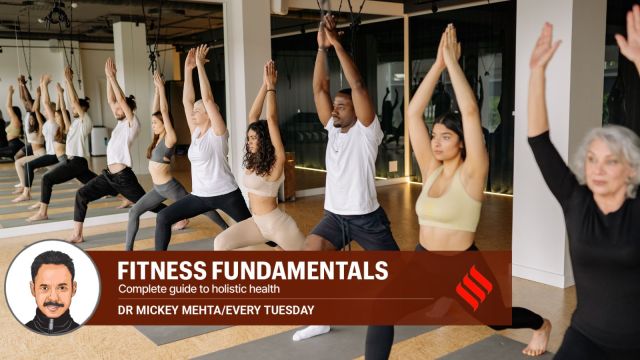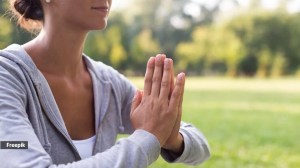- India
- International
Can exercising twice a week cure insomnia? A new study highlights benefits of aerobics, yoga
Holistic health expert Dr Mickey Mehta on how slotting exercise routines at certain times in the day can work
 In terms of sleep quality and duration, active participants were 55 per cent more likely to sleep between six and nine hours a night and 29 per cent less likely to be short sleepers. (Representative Image)
In terms of sleep quality and duration, active participants were 55 per cent more likely to sleep between six and nine hours a night and 29 per cent less likely to be short sleepers. (Representative Image)If you exercise just twice a week, you can reduce your risk of insomnia, according to a new study published in BMJ. The logic is rather simple and something which we know — that the longer you are active and use every muscle in your body, the faster it would want to relax and rest, inducing sleep.
So what did the researchers from Iceland, who analysed 4,399 people from nine European countries, find? Those who exercised at least twice a week were 42 per cent less likely to struggle falling asleep. They were also 22 per cent less likely to have any symptoms of insomnia and 40 per cent less likely to have two or more symptoms of insomnia. In terms of sleep quality and duration, active participants were 55 per cent more likely to sleep between six and nine hours a night and 29 per cent less likely to be short sleepers (sleeping six hours or less). The study’s findings also revealed that exercising over the long term is crucial as participants, who were once active but became inactive, lost the association between exercise and sleep over the years.
I would suggest a routine that can set your body up for a restful sleep. Begin with cardio and aerobics in the early part of the day, settle into high-intensity exercise in the middle or afternoon and try light exercises and yoga in the evening. Remember that good sleep is essential to encourage you to be diligent about sticking to your exercise routines. You may be too weary to engage in physical activities after a poor night’s rest.
GO FOR CARDIO AND AEROBICS
Therapists have found that people who engage in at least 30 minutes of moderate aerobic exercise may see a difference in sleep quality that same night. Moderate-intensity activities increase your heart rate and could involve anything as simple as walking or cycling. Try talk therapy or exercising while you hold a conversation. This rejuvenates the body and brain axis. Vigorous intensity aerobics like swimming, jogging and running, elevate heart rate and oxygen consumption, promoting overall cardiovascular health, which helps in good sleep.
Any movement, regulated well with breath, increases your energy output and is a challenge to the body. It is good for the heart and lungs.
Resistance Exercise

Resistance exercise or strength training focuses on building muscle strength throughout the body. This includes lifting weights, working out using resistance bands, push-ups, squats, sit-ups, lunges and crunches. These use the resistance of your body and gravity to help strengthen your muscles and improve your coordination, endurance and mobility. The trick is to do these in sets, gradually increasing them. You can even do functional training, where you work several muscle groups in a single exercise. All these boost levels of adenosine, the chemical that makes you drowsy and often helps people fall asleep easily. These exercises also lower your risk of anxiety and depression.
HOW YOGA PREPS YOU FOR SLEEP
Yoga promotes relaxation and reduces stress by combining physical postures, breathing exercises and meditation. Frequent yoga practice, particularly soft or restorative poses, can help the body and mind relax and get ready for sleep. It activates the physiological mechanisms in the body and brain that lead to higher-quality sleep.
SOME SLEEP-FRIENDLY ROUTINES
Spend as much time as possible outdoors with trekking, gardening and nature walks. These expose you to natural light and fresh air, which help improve sleep-wake cycles and regulate circadian rhythms.
Follow a bedtime routine: Unwind with deep breathing exercises, gentle stretches or meditation. Steer clear of intense exercise right before bed because it might increase body temperature and heart rate, which can make it more difficult to fall asleep. Exercise causes an increase in core body temperature, which tells the body clock that it is time to wake up. The temperature of the core body begins to drop after 30 to 90 minutes. The decrease encourages drowsiness.
As the body naturally moves from passivity to activity, it also moves from activity to passivity by itself. The idea is to get the body into this rhythm.
Apr 05: Latest News
- 01
- 02
- 03
- 04
- 05





























